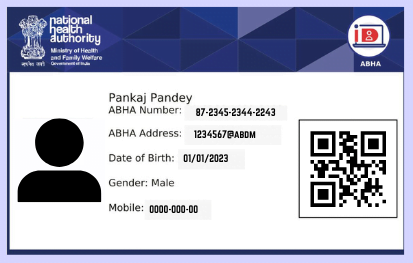The Gujarat government is spearheading a revolutionary initiative to enhance the healthcare system in the state. By issuing digital health cards, known as Ayushman Bharat Health Account (ABHA) cards, the government aims to monitor the cognitive development and nutrition level of schoolchildren. Under the Shala Arogya-National Child Health Program (SHRBSK), Gujarat has become the first and only state in the country to implement such a comprehensive system. Firstly, this digital identification card serves as a comprehensive health profile for students, allowing schools to track and monitor their medical history, allergies, immunizations, and other vital health information.
The Ayushman Bharat Health Account (ABHA) Card
The ABHA card, short for Ayushman Bharat Health Account, is a digital health card that contains a unique 14-digit identification number known as the ABHA ID. This ID serves as a means to access and maintain a comprehensive record of an individual’s health-related information. From their entire medical history to consultation details and prescriptions, everything is neatly stored within the ABHA ID. The launch of this comprehensive health check-up campaign took place on June 12, 2023. It introduces the ABHA card as a powerful tool that simplifies healthcare processes and promotes accurate diagnoses. With the ABHA ID, individuals can expect a seamless experience managing their health information securely and efficiently.
The ABHA card empowers individuals to take charge of their health and make informed decisions. By having access to their complete medical history and timely reminders for check-ups and vaccinations, individuals can adopt a proactive approach towards their well-being. This level of involvement not only ensures better health outcomes but also promotes a sense of ownership and responsibility for one’s own health.

Supporting Healthcare Professionals
For healthcare professionals, the ABHA card proves to be a valuable tool. By having access to comprehensive patient records, doctors can make accurate diagnoses, prescribe appropriate treatments, and avoid potential conflicts resulting from incomplete information. Furthermore, the ABHA card system establishes a seamless communication channel between healthcare providers, facilitating collaborative care and ultimately benefiting patients.
Advantages of the ABHA Card to Schools
The ABHA card, as it is referred to in Gujarat, has several notable advantages for schools and educational institutions.
- Comprehensive Tracking
The digital health cards enable schools to comprehensively track the nutrition levels and cognitive development of their students. With this data at their fingertips, educators and healthcare professionals can devise targeted strategies to enhance the overall well-being of children.
- Timely Interventions
By monitoring health parameters regularly, the digital health cards enable swift identification of any deviations from the norm. This enables timely interventions, such as nutritional counseling, supplementation, or referrals to specialists, ensuring that students receive the necessary support for their overall development.
- Enhanced Collaboration
The digital health cards promote better collaboration between schools, parents, and healthcare providers. The easy accessibility of health records fosters open communication and ensures that all stakeholders are well-informed about a child’s health status. This collaboration creates a holistic approach to a child’s well-being, with everyone working together towards their optimal growth.
- Data-Driven Decision Making
With a wealth of health data available through digital health cards, schools can make informed decisions regarding various aspects of education. By analyzing trends and patterns, they can identify areas needing improvement and implement targeted initiatives for better nutrition and cognitive development.
- Efficient Resource Allocation
By having a clear understanding of their students’ nutritional needs and developmental progress, schools can allocate resources more efficiently. They can direct their efforts towards areas that require greater attention, ensuring that resources are maximized for the well-being of every child.
With the ABHA Card, schools gain valuable insight into each student’s health condition, enabling them to ensure a safe and secure environment. The advantages of implementing the ABHA Card in schools are manifold. Firstly, it streamlines the process of accessing important health information, eliminating the need for paper-based records and reducing the chances of errors or misplacement. Additionally, this digital identification card enhances the efficiency of schools’ health services by providing real-time updates on students’ health status, allowing for prompt and targeted intervention when necessary. Furthermore, the ABHA Card promotes better communication between schools and parents, enabling seamless sharing of health information and ensuring that parents are well-informed about their child’s medical needs. This innovative technology not only prioritizes the well-being of students but also empowers schools to effectively manage and respond to health-related situations.
Revolutionizing Healthcare in Gujarat
Gujarat’s implementation of the ABHA card system sets a benchmark for other states in India. By pioneering digital health cards and integrating them into the education system, the state government demonstrates its commitment to revolutionizing healthcare. The ABHA card’s ability to monitor the cognitive development and nutrition levels of schoolchildren allows Gujarat to proactively address health issues and ensure the well-being of its young population.
In conclusion, the Ayushman Bharat Health Account (ABHA) card has revolutionized healthcare in Gujarat. By harnessing the power of digital technology, the government has successfully implemented a comprehensive system to monitor the health of schoolchildren. Gujarat’s trailblazing initiative sets an example for other states, showcasing the potential of digital health cards to transform healthcare systems across the nation. These cards provide valuable insights into children’s health parameters, allowing for timely interventions, enhanced collaboration, data-driven decision-making, and efficient resource allocation. As the pioneers in this field, these states are not only ensuring the overall well-being of their students but also setting an example for other regions to follow. With the digitization of healthcare records, we can expect better health outcomes and a brighter future for our children.
